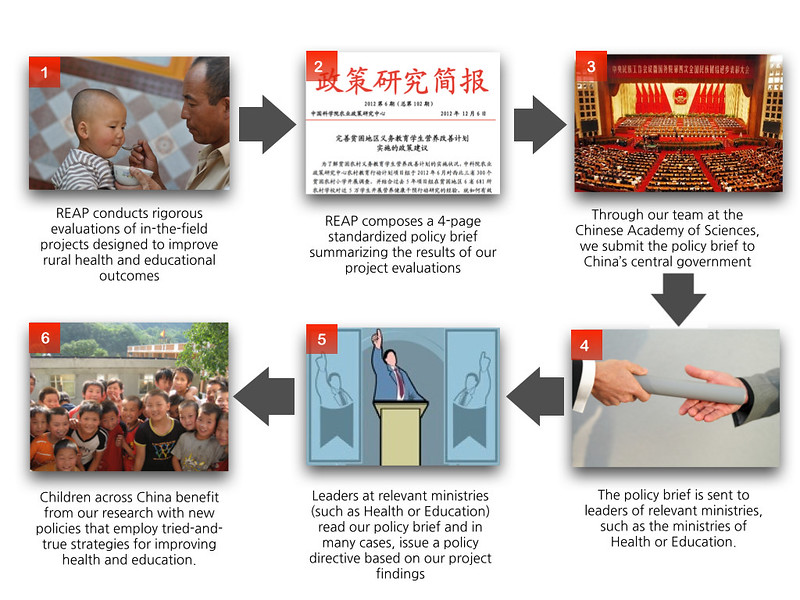Policy Impact
Policy Impact
At REAP, our goal is policy change. Once we know which interventions work and which ones do not, we share our results with local, regional, and national policymakers across China, who can take steps to ensure successful strategies are picked up and implemented more broadly.
REAP's institutional relationship with the Chinese Academy of Sciences allows REAP the unique capacity to write policy briefs that can be directly channeled to China's top level decision-making bodies. For more information on policy briefs, please see Frequently Asked Questions about Policy Briefs ( 172.65 KB  ).
).
In addition to the dialogue with national leaders, we advise provincial and county departments of education, health (including Centers for Disease Control & Prevention), and finance in six provinces. Through this network of government partnerships, REAP has successfully persuaded policymakers to scale up effective pilots, modify or stop ineffective ones, and answer difficult questions about the impact of policies, programs, and public investments.

The REAP Roadmap: Research to Action
How does REAP affect policy change and continue to help direct effective investments to China's most disadvantaged areas? From conducting impact evaluations to successfully making our case, follow the six steps below to learn more about how REAP delivers compelling policy recommendations into the right hands.

Policy Briefs Published by REAP
To date REAP has submitted 20 policy briefs that target a range of issues from junior high enrollment to students health. Nearly every brief has been accepted by the Policy Advice Desk of China's State Council, leading to policy responses by relevant government agencies, such as the Ministries of Education and Health.
| 1 | The Development of Cooperative Rural Medical Care: Policy Evaluation and Suggestions for Reform |
| 2 | Promoting the Development of the Rural Education System through Preschool Education |
| 3 | Improving School Management in Rural Western Areas and Protecting the Health of Boarding School Students |
| 4 | Improving the Education of Migrant Children |
| 5 | The Future Direction of Rural Investment: Village Level Infrastructure Investment and the Changing Wishes of Rural Residents |
| 6 | Promoting Childhood Development by Eliminating Childhood Anemia in Impoverished Areas |
| 7 | Childhood Intestinal Parasitic Infections in Impoverished Areas: Suggestions for Research and Policy |
| 8 | Dropping Out of Middle School: A Critical Problem in Poor Rural Areas |
| 9 | Suggestions for Quickly Eliminating Childhood Anemia in Poor Rural Areas |
| 10 | The Nutritional Milk and Eggs Program: A Call to Consider Eliminating Childhood Anemia in Poor Rural Areas |
| 11 | Ningxia's Nutrition through Eggs Program: A Call to Consider Eliminating Childhood Anemia in Poor Rural Areas |
| 12 | The Safety of Accommodations at Rural Elementary Boarding Schools |
| 13 | Research on Development of Basic Services in Ningxia |
| 14 | Exploration and Policy Suggestions for Popularization of Education in Rural High Schools in Poor Areas |
| 15 | Exploration and Policy Suggestions to Improve Poor Rural Areas and Urban Migrant Schools’ Academic Performance (CAL) |
| 16 | Policy Recommendations on the Implementation of Nutrition Improvement Plan for Students Under Compulsory Education in Poor Areas |
| 17 | Research and Policy Recommendations on the Situation of Infant Malnutrition and Underdevelopment in Poor Areas |
| 18 | Advisory for Implementing a Free Nutritious Lunch Program in Compulsory Schools in Poor Rural Areas |
| 19 | Policy Recommendations on the Control and Prevention of Myopia Among Primary School Students in Poor Rural Areas |
| 20 | Suggestions to Improve the Quality and Development of Vocational Schooling in China |

